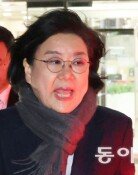38-day Limited Special Investigation
38-day Limited Special Investigation
Posted February. 22, 2008 03:37,
However thoroughly we investigated, I think half of Koreans wont believe the result, sighed a special prosecutor.
Some ten special prosecutors talked about their difficulties as they drank beer at a pub near special investigator Chung Ho-youngs office in Seoul Wednesday night. Given that drinking was prohibited during their investigation, the gathering was in effect the dissolution of the investigative body.
A prosecutor lamented, We worked really hard until late at night everyday except for the New Years day to find out the truth.
He complained about some politicians who claim that the special prosecutors almost discharged the case when they investigated President-elect Lee Myung-bak while having lunch with him for three hours on Feb. 17. Other prosecutors showed concerns that the public would predict the result hastily rather than giving a careful look at the truth just because the investigation result came out in favor of Lee.
The BBK special counsel has been criticized for its political approach before the start of the investigation. Some politicians completely refused to accept the results from a previous probe into the case and instead proposed a BBK special investigation bill, considering its influence on the outcome of the presidential election. In addition, the constitutionality of the bill has long been questioned.
The short investigation period, which had to be shorter than 40 days given the inauguration of President-elect Lee, was also one of the fundamental problems of the investigation. Even if the prosecutors found Lee faulty, they could not prosecute the president after he comes into office on Feb. 25.
Law professor Jang Yeong-soo of Korea University said, Prosecutors formed the special investigation team knowing that a court cannot be held, even if they prosecute him without admitting what they investigated lawfully. (Forming a special counsel) was a choice made based on the political purpose.
Under these circumstances, the special team faced challenges from the start. The Constitutional Court ruled that an article requiring references to attend the investigation of the special bill was unconstitutional, hampering the subpoena of references.
The special prosecutors began to persuade every single reference accordingly.
Kim Jae-jeong, the least cooperative in last years investigation, had initially planned to attend the investigation, but after intense persuasion by special prosecutors, he responded to the request twice voluntarily. He had to receive dialysis every other day, but he actively cooperated with the prosecutors, saying, I am willing to get investigated even while lying in bed.
The prosecutors looked into 139 people including Kim 206 times for 38 days and reviewed exhibits including about 80,000-page investigative reports, 36 volumes of account track records, 28 volumes of financial analysis data, and 40 volumes of audit reports. They raided 25 branches of DAS Corporation including its headquarters in Gyeongju to secure more evidence.
After obtaining the U.S. court records and the FBI documents related to Kim Kyung-joon and Erica Kim, they confirmed that he stated differently in the Korean and the U.S. courts and that he embezzled funds to overseas.
As the special investigation results were almost no different from last years investigation, some are raising questions about the meaningless probe that wasted the tax money.
Prosecutor Choi Cheol said, Tell those who created the special investigation about the meaninglessness of the investigation. We announced the truth after digging it at our own stake. We did not make up to meet somebodys expectation.
bell@donga.com




![“한동훈, 정치생명 걸고 무소속 출마해 평가받는 것 고려할만”[정치를 부탁해]](https://dimg.donga.com/c/138/175/90/1/wps/NEWS/IMAGE/2026/01/19/133186982.1.jpg)


